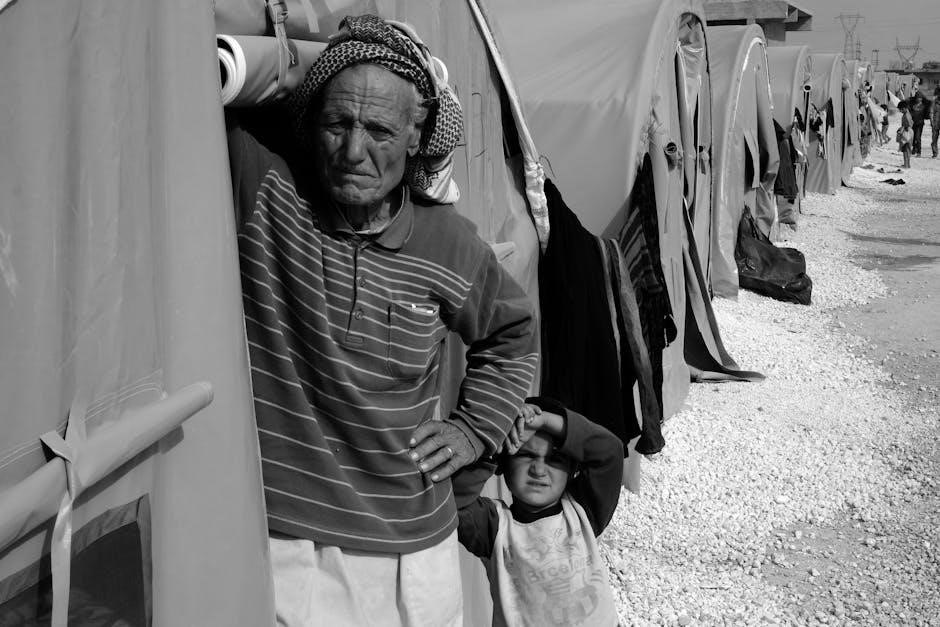Families as They Really Are‚ 2nd Edition‚ edited by Barbara J. Risman and Kristi Williams‚ provides a comprehensive exploration of family dynamics through cutting-edge research and essays.
Published in 2023‚ this updated edition offers fresh insights into the complexities of modern family life‚ emphasizing diversity‚ inequality‚ and the evolving roles within families globally.
By blending sociological theories with real-world examples‚ the text challenges stereotypes and highlights the resilience and adaptability of families in contemporary societies.

Overview of the Book and Its Significance
Families as They Really Are‚ 2nd Edition is a groundbreaking collection of essays that delves into the complexities of family life in contemporary society. Edited by Barbara J. Risman and Kristi Williams‚ the book offers a nuanced exploration of how families operate‚ challenging traditional notions and stereotypes. It incorporates the latest research on topics such as gender roles‚ parenting styles‚ and the impact of social inequality. The second edition expands on the original by including updated data‚ broader cultural perspectives‚ and a deeper focus on childhood and parenting. By presenting diverse voices and experiences‚ the book provides a comprehensive understanding of families in all their forms. Its significance lies in its ability to bridge academic theory with real-world applications‚ making it a valuable resource for students‚ researchers‚ and policymakers alike.
Authors and Their Contributions to Family Sociology
Barbara J. Risman and Kristi Williams‚ editors of Families as They Really Are‚ 2nd Edition‚ are prominent scholars in family sociology. Risman‚ known for her work on gender and family dynamics‚ brings a critical lens to understanding how gender shapes family experiences. Williams‚ with expertise in health and family structures‚ contributes insights into the intersection of family life and social inequality. Together‚ they curate a collection of essays that reflect diverse perspectives‚ ensuring a comprehensive exploration of family sociology. Their collaborative effort highlights the complexities of modern families‚ offering a platform for both established and emerging voices in the field. Their work bridges theory and practice‚ making the book a vital resource for understanding contemporary family dynamics and their societal implications.
Theoretical Foundations of Family Sociology
Family sociology is rooted in theories like functionalism‚ conflict theory‚ and symbolic interactionism‚ which explore family structures‚ roles‚ and dynamics. These frameworks provide a foundation for analyzing how families operate within societal contexts‚ shaping individual and collective experiences. By examining power relations‚ gender roles‚ and socialization processes‚ these theories offer insights into the complexities of family life and its evolution over time. They also highlight how families adapt to changing social‚ economic‚ and cultural conditions‚ ensuring a nuanced understanding of family systems and their impact on society. This theoretical base is essential for addressing contemporary family issues and promoting equitable social policies.
The Sociological Perspective on Families
The sociological perspective on families examines them as social institutions shaped by broader societal structures‚ such as economics‚ culture‚ and power dynamics. This approach emphasizes how families reflect and reproduce social inequalities‚ including gender‚ race‚ and class. By studying families through a sociological lens‚ researchers uncover how societal norms and policies influence family roles‚ relationships‚ and well-being. The second edition of Families as They Really Are highlights the diversity of family forms‚ challenging traditional notions of family as a universal or static entity. It explores how families navigate intersectional identities and adapt to changing social contexts‚ such as globalization and technological advancements. This perspective underscores the importance of understanding families within their specific historical and cultural settings‚ rather than idealizing them as homogeneous or unchanging units. By doing so‚ it provides a nuanced framework for addressing the complexities of modern family life.
Gender and Sexuality in Family Dynamics
Gender and sexuality play pivotal roles in shaping family dynamics‚ as explored in Families as They Really Are‚ 2nd Edition. The book examines how gender norms influence roles within families‚ from caregiving to economic responsibilities. It also delves into the intersection of gender identity and sexual orientation‚ highlighting how these factors impact family relationships and societal expectations. By addressing topics like same-sex parenting‚ gender fluidity‚ and the division of labor‚ the text challenges traditional views of family structures. The authors emphasize the importance of recognizing diversity in gender expressions and sexual orientations to better understand contemporary family life. This chapter provides a critical lens for analyzing how gender and sexuality intersect with power dynamics within families‚ offering insights into the evolving nature of these relationships in modern society.
Contemporary Issues in Family Studies
Contemporary Issues in Family Studies explores how modern societal shifts‚ such as inequality and diversity‚ shape family life‚ offering insights into the challenges and adaptations of today’s families.
Modern Family Structures and Their Evolution
Modern family structures have evolved significantly‚ reflecting societal changes and diverse needs. The traditional nuclear family is no longer the sole model‚ as single-parent households‚ blended families‚ and same-sex parents become increasingly common. These shifts are driven by factors like women’s increased workforce participation‚ delayed marriage‚ and changing attitudes toward gender roles. The rise of multi-generational households‚ particularly in response to economic pressures‚ further illustrates this evolution. Such changes challenge outdated norms and highlight the adaptability of families in responding to contemporary challenges. By examining these emerging structures‚ researchers gain insights into how families navigate and redefine their roles in society.
The Impact of Social Inequality on Family Life
Social inequality profoundly shapes family life‚ influencing opportunities‚ resources‚ and relationships. Economic disparities‚ racial discrimination‚ and gender inequities create uneven playing fields for families. Wealthier families can afford better education‚ healthcare‚ and extracurricular activities‚ while marginalized groups face systemic barriers. Single-parent households and families of color often experience heightened stress due to limited access to resources. Gender roles further exacerbate inequalities‚ as women disproportionately bear caregiving responsibilities. These dynamics not only affect family stability but also perpetuate cycles of disadvantage across generations. Addressing social inequality is crucial to fostering equitable opportunities and strengthening family well-being in diverse contexts.

The Role of Parenting and Childhood in Families
Parenting and childhood are central to family dynamics‚ shaping identities‚ values‚ and relationships across generations. These roles influence emotional‚ social‚ and economic outcomes‚ reflecting societal changes and diversity.
Parenting Styles and Their Effects on Child Development
Parenting styles significantly shape child development‚ influencing emotional‚ social‚ and cognitive growth. Authoritative parenting‚ characterized by warmth and structure‚ fosters resilience and independence. In contrast‚ permissive styles may lead to impulsivity‚ while neglectful parenting can result in emotional detachment. Research in Families as They Really Are‚ 2nd Edition highlights how societal expectations and cultural norms further complicate these dynamics. For instance‚ authoritative parenting is often idealized in Western cultures‚ yet economic constraints may limit its practice. Additionally‚ the book explores how parenting styles adapt to modern challenges‚ such as digital media and gender equality. These insights underscore the complexity of parenting roles and their enduring impact on children’s lives‚ emphasizing the need for adaptive and empathetic approaches in diverse family contexts.
The Changing Dynamics of Childhood in Modern Societies
Childhood in modern societies is undergoing significant transformations‚ shaped by cultural‚ technological‚ and economic shifts. The concept of childhood as a protected period of development is evolving‚ with children increasingly exposed to global influences and digital media. In Families as They Really Are‚ 2nd Edition‚ researchers explore how these changes affect family dynamics‚ highlighting the tension between traditional nurturing roles and contemporary demands. For instance‚ children today often assume more responsibilities‚ such as caregiving for siblings or elderly relatives‚ reflecting the fluidity of family roles. Additionally‚ the rise of digital education and entertainment has redefined how children spend their time‚ altering their cognitive and social development. These shifts underscore the need to redefine childhood within the context of modern family structures and societal expectations‚ emphasizing adaptability and resilience in young individuals.

Cultural and Social Influences on Families
Cultural norms and social expectations profoundly shape family structures‚ values‚ and interactions. Families as They Really Are‚ 2nd Edition explores how globalization and media influence these dynamics‚ reshaping traditional roles and fostering diversity in family life across societies.
Cultural Diversity in Family Practices and Values
Cultural diversity significantly influences family practices and values‚ shaping how families operate across different societies. Families as They Really Are‚ 2nd Edition highlights how globalization and migration have led to the blending of cultural traditions‚ creating unique family dynamics. The book explores variations in parenting styles‚ gender roles‚ and child-rearing practices‚ emphasizing the importance of understanding these differences in a multicultural world. Through case studies and real-life examples‚ the text illustrates how cultural values such as collectivism and individualism impact family relationships. It also examines how cultural norms evolve over time‚ adapting to modern societal changes. By addressing these topics‚ the book provides a nuanced perspective on the diversity of family experiences‚ fostering empathy and inclusivity in understanding the complexities of family life.
Social Policies and Their Impact on Family Life
Social policies play a pivotal role in shaping family life‚ influencing economic stability‚ healthcare access‚ and educational opportunities. Families as They Really Are‚ 2nd Edition examines how policies like paid parental leave‚ childcare support‚ and tax incentives impact family well-being. The book highlights disparities in policy implementation‚ noting that marginalized groups often face systemic barriers to accessing resources. It also explores how policies addressing poverty and inequality can either mitigate or exacerbate family stress. By analyzing real-world examples‚ the text reveals how effective social policies can foster resilience and equality‚ while inadequate policies may deepen societal divides. This section underscores the importance of aligning policy design with the diverse needs of contemporary families‚ emphasizing the role of advocacy in creating equitable systems.
Families as They Really Are‚ 2nd Edition concludes by emphasizing the need for adaptive social policies and further research to address the evolving nature of family structures and dynamics‚ ensuring equitable support for diverse families in a changing global landscape.
Implications for Social Policy and Family Research
Families as They Really Are‚ 2nd Edition underscores the critical need for policies that reflect the diversity of modern families‚ addressing inequalities in access to resources and support systems.

By highlighting the intersection of gender‚ sexuality‚ and socioeconomic status‚ the book calls for reforms in areas like parental leave‚ healthcare‚ and education to better accommodate diverse family structures.
Researchers are encouraged to adopt inclusive methodologies that capture the complexities of family life‚ ensuring that marginalized voices are represented in policy development and academic studies.
Moreover‚ the text advocates for increased funding and interdisciplinary collaboration to explore long-term impacts of social policies on family well-being‚ fostering a more equitable and adaptive societal framework for all families.
The Future of Family Studies in a Changing World
The field of family studies is poised for transformative growth as global societal shifts reshape family dynamics. Families as They Really Are‚ 2nd Edition highlights the necessity of adapting research frameworks to capture the complexities of modern families‚ including diverse structures‚ gender roles‚ and cultural influences.
Future research must prioritize interdisciplinary collaboration‚ integrating insights from sociology‚ psychology‚ and policy studies to address pressing issues like inequality and technological impacts on family life.
By embracing a global perspective‚ scholars can explore how migration‚ globalization‚ and economic changes influence family relationships‚ offering a more inclusive understanding of familial experiences worldwide.
Ultimately‚ the future of family studies lies in its ability to evolve alongside societal changes‚ providing actionable insights to support families in navigating an increasingly complex world.
